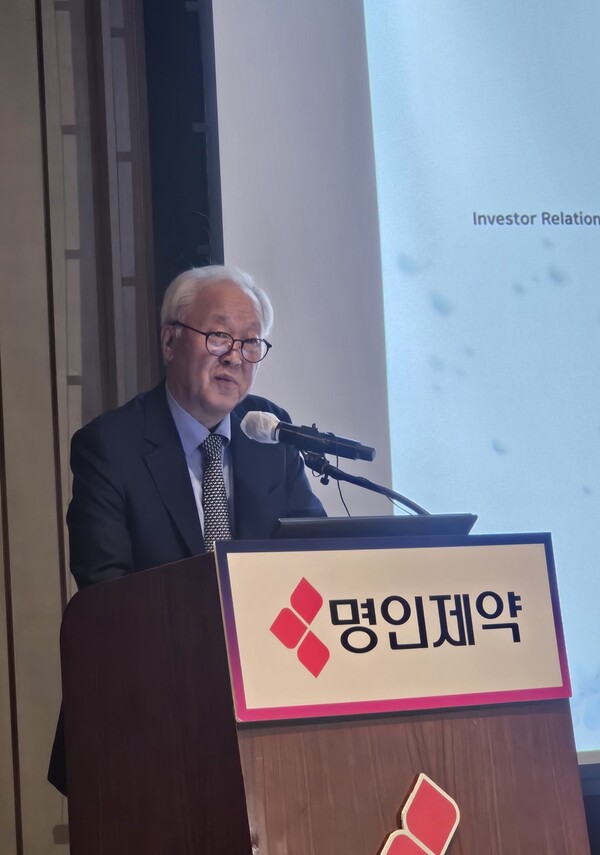Korea’s Myung In Pharm is turning a four-decade CNS franchise outward, telling investors it will use an upcoming Kospi listing to crack markets where, as one executive put it, some potential partners wouldn’t “even start a deal discussion” while the company remained private.
The float, CEO Lee Hang-myung said at Monday’s IPO press conference, is meant to buy credibility abroad and recruit talent at home, and to pave a shift to professional management within three to four years.
In Korea, where many drugmakers are still founder-led and listings can double as succession tools, Lee pushed back, saying the IPO is “solely about growth and credibility,” not a handoff.

The scale he is selling is concentrated in the brain. Prescription medicines for psychiatry and neurology made up about 76 percent of revenue last year. Total revenue in 2024 was 269.6 billion won ($194 million) on a standalone basis, according to Myung In Pharm’s regulatory disclosure.
The first half of 2025 shows the same mix: CNS drugs generated about 95.3 billion won (95.077 billion domestic plus 257 million in exports, standalone). By the company’s read of IQVIA data, Myung In ranked No. 1 in Korea for CNS prescription volume in both 2023 and 2024.
Exports barely register for now. In the first half, total exports were 450 million won, of which prescription-drug exports were 438 million won, equal to 0.32 percent of sales, the filing shows. “The work of going global starts now,” Lee told reporters.
What changes with a ticker? “Due diligence and doors,” said Lee Jung-uk, executive director for R&D, business development and licensing. For in-licensing, listing is “the practical threshold.” Without it, he said, some multinationals will not “even start a deal discussion.” For out-licensing, he added, IP and data still decide outcomes. Either way, the operating plan is to manufacture at home to control cost and quality, then “build region by region.”
Manufacturing and formulation are where Myung In intends to prove the point. The company is finishing a dedicated pellet facility it says will be Korea’s largest, aiming for EU-GMP in late 2026 and full production in the second quarter of 2027 with at least 250 million capsules of annual capacity.
More than half of that capacity will be kept for Myung In’s own products, with the remainder available to CDMO clients, executives said. In parallel, the firm is expanding in-house API output at its Baran site to reduce import exposure and “blunt supply shocks,” as management described in the filing.
The disclosure cites 100-plus suppliers, roughly one year of raw-material and semi-finished inventory on hand, and a five-year average in which raw materials accounted for about 38.6 percent of cost of goods.
The clinical spine of the push comes from licensed programs. Myung In holds exclusive Korean rights to evenamide, licensed from Italy’s Newron Pharmaceuticals and now in global phase 3 trials. Management frames it as an adjunct therapy for treatment-resistant schizophrenia, with a second-half 2027 Korea launch possible if enrollment stays on track.
It also licensed P2B001, a fixed low-dose ER combo of pramipexole and rasagiline, from Pharma Two B; bioequivalence is complete in Korea, and Myung In holds local registration, manufacturing, and sales rights, according to the filing.
Inside the CNS bag, Kang Hee-jin, general manager of the IR team, pointed to what he called “stickier demand,” treatment courses that often run for years or for life, and to breadth: 225 CNS products, including 31 that are exclusive in Korea. Lower-strength doses that originators do not offer, he said, can matter for Korean patients who are sensitive to side effects.
“Outstanding research and growth ultimately depend on outstanding people,” Lee said, noting what he described as the growing reluctance of young scientists to join unlisted firms. On governance, he promised to separate ownership and management “within three to four years.” On shareholder returns, Finance Director Jee Kyoung-sook said payout policy will move toward the around 30 percent range common among higher-distributing peers, while stopping short of a hard target before pricing.
What the company did not provide were the names of first-wave commercial partners, a country-by-country timetable or a geographic split of proceeds. Asked for specifics, executives returned to the manufacturing refrain: make in Korea, hold the cost line, then extend “region by region.”
Myung In Pharm will offer 3.4 million shares at 45,000 to 58,000 won, targeting 153 billion to 197.2 billion won in proceeds. The band sits up to 47 percent below an internal 85,000 won valuation, fueling “low-price listing” chatter and succession talk. Retail subscriptions run Thursday and Friday, with KB Securities as lead underwriter.
Related articles
- Myungin Pharm eyes schizophrenia drug candidate as growth driver ahead of IPO
- Myungin Pharm files for IPO to raise up to ₩197 bil. won, eyes global CNS expansion
- Myung In Pharm bucks Korea’s pharma slump with $60 mil. profit ahead of Kospi debut
- Myung In Pharm to debut on Kospi Oct. 1 after strong investor demand

